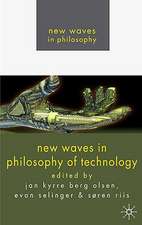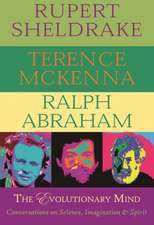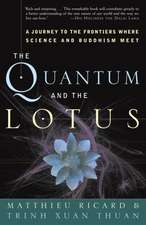Scientific Method: The Hypothetico-Experimental Laboratory Procedure of the Physical Sciences
Introducere de J.K. Feiblemanen Limba Engleză Paperback – 31 iul 1972
Preț: 366.54 lei
Nou
Puncte Express: 550
Preț estimativ în valută:
70.16€ • 76.23$ • 58.97£
70.16€ • 76.23$ • 58.97£
Carte tipărită la comandă
Livrare economică 16-22 aprilie
Preluare comenzi: 021 569.72.76
Specificații
ISBN-13: 9789024712007
ISBN-10: 9024712009
Pagini: 256
Ilustrații: 254 p.
Dimensiuni: 156 x 244 x 13 mm
Ediția:Softcover reprint of the original 1st ed. 1972
Editura: SPRINGER NETHERLANDS
Colecția Springer
Locul publicării:Dordrecht, Netherlands
ISBN-10: 9024712009
Pagini: 256
Ilustrații: 254 p.
Dimensiuni: 156 x 244 x 13 mm
Ediția:Softcover reprint of the original 1st ed. 1972
Editura: SPRINGER NETHERLANDS
Colecția Springer
Locul publicării:Dordrecht, Netherlands
Public țintă
ResearchCuprins
I. Introduction: Method, Domain and Findings.- 1. The understanding of science.- 2. The definition of science.- 3. The principal divisions of science.- 4. The multi-stage process.- 5. Beyond the mesocosm.- 6. The interpretation of science.- 7. The theory of practice.- 8. From theory to practice.- 9. Technology.- 10. From practice to theory.- 11. Cross-field applications.- 12. The aims of this handbook.- II. The Search for Data: Observation.- 1. Simple observation.- 2. Controlled observation.- 3. Observed facts.- III. The Search for Hypotheses: Induction.- 1. The derivation of classes.- 2. The formulation of inductions.- IV. The Adoption of an Hypotheses.- 1. Definition and description.- 2. Character.- 3. Criteria.- 4. Kinds.- 5. Occasions.- 6. Discovery.- 7. Function.- 8. Indispensability.- 9. Adoption.- V. The Testing of Hypotheses: Experiment.- 1. The meaning of “experiment”.- 2. The design of experiments.- 3. The logic of experiments.- 4. Experimental criteria.- 5. The use of instruments.- 6. Measurement.- 7. The use of techniques.- 8. Experimenting.- 9. Types of experiments.- 10. Varieties of results.- 11. Interpretations of the data.- 12. Empirical probability.- VI. The Testing of Theories: Calculation.- 1. The stage of mathematical verification.- 2. The requirements of a good scientific theory.- 3. The application of mathematics from the standpoint of mathematics.- 4. The application of mathematics from the standpoint of empirical formulations.- 5. Advanced mathematical verification.- 6. Difficulties of final formulations.- 7. The aim of deductive structures.- 8. Mathematical probability and causal law.- VII. The Testing of Laws: Prediction and Control.- 1. Prediction.- 2. Control.- 3. The end of scientific investigation.- VIII. Types of EmpiricalDiscoveries.- 1. Empirical systems.- 2. Empirical areas.- 3. Laws.- 4. Entities.- 5. Processes.- 6. Formulas and rules.- 7. Procedural principles.- 8. The limits of empirical discovery.- References.
















